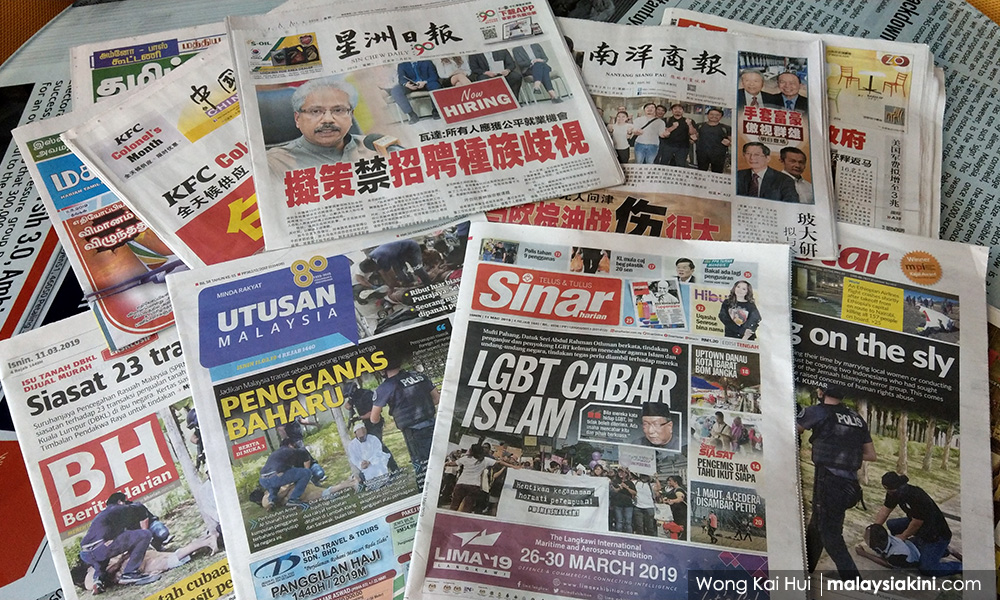How half-truths and the Internet (finally) kills the press
LETTER | At the end of 2019, Media Prima – the largest news conglomerate in the country – announced that it would be scaling back, cutting 543 jobs across its subsidiaries and publications.
These included a significant chunk of journalists and photographers from its three newspapers: New Straits Times, Berita Harian and Harian Metro.
The announcement followed not one but two downsizing exercises that had already been done in the form of voluntary separation schemes (VSS) – a practice that many other news organisations like The Star have undergone in recent years.
Utusan Malaysia, the oldest Malay newspaper in the country, went completely belly up and ceased operations in October.
Many may partly attribute these falls from grace to the lost of BN in the last election, as it has long been known that many news organisations are politically-linked through the ownership of their parent companies.
But in media circles and elsewhere, a more common culprit has emerged: the internet and an unwillingness for old-school organisations to adapt to new communication technologies.

And it’s not only here. Everywhere in the world, newsrooms are shrinking.
The Guardian candidly states “we’re going to need each other this year” in an appeal to its online visitors to become digital subscribers and The New York Times pleads for US$1 (RM4.07) a week (its cooking and crosswords section is free).
Born around 1990, the internet only picked up speed in individual homes around the turn of the century with email moving beyond small networks of computers and military users to become globally accessible through the World Wide Web.
The release of the first iPhone in 2007 revolutionalised person-to-person communication and literally, put a world of information and communication in a person’s pocket.
From steep data charges, now just over a decade later, information has become practically free, at least from a user’s monetary point of view.
Call your friend on the other side of the world? Free.
Find out how to open a bottle cap without a bottle opener? Watch a video and it’s free.
Find out how many times Jennifer Aniston bumped into Brad Pitt at the Golden Globes and SAG awards? Irrelevant. But also free. (And to some people, sadly, priceless.)
The internet and a world of free information has resulted in the masses expecting free news.
After all, shouldn’t everything on the internet be free?
But when you pay peanuts, you end up with monkeys doing the job.
Like discount bins, buying dented tins and nearly expired food once in a while won’t kill you but eat nothing but that and you may start to see adverse effects.

And those effects are what we have in the world today – rampant mistrust, a lack of expectation and, indeed, demand for truthfulness and a shurg-away attitude that that’s the way the world is.
And US President Donald Trump, who gets to say something different every day.
Cue the ominous warnings of countless university lecturers warning us that while the internet expands our range of communication, it cheapens its depth.
With its worldwide platform, the internet has become our gossip circle on steroids.
So many things are passed around, digested and added to, that no one truly knows how much of it is real.
But when it came to facts and the news, the truth used to matter.
Information used to come at a price: about RM1 a day and it was delivered, actually thrown, onto your doorstep each morning.
If it was in the paper, it was real.
If it was wrong, there would be an apology, also printed in the paper, and hell to pay.
In a competitive news world, getting it first was always nice but getting it right was undoubtedly more important.
You could get sued for getting it wrong, but not for getting it late.
The big bad internet completely changed the manner, but more importantly, the speed in which people received information.
Newspapers run on a daily news cycle (half a day for several Chinese papers that have a night edition) but suddenly, the dissemination of news was converted to real-time.
It was like competing with television but much worse.
Seconds matter and there was only a prize for first place: to be quoted, shared and accredited until the next piece of news broke.
News was stripped to its barest elements and it started to not matter if a few names or figures were slightly off, as long as you got the news out before anyone else.
Getting it first suddenly became the most important part about news, with getting it right a distant second.
Under this pressure, news organisations in Malaysia jumped on the bandwagon and hastened our own death.
Mistakes and misinformation in online stories mysteriously disappear without a trace or acknowledgement of any previous version.
While some news organisations, like CNN and The Washington Post are digging in their heels and clearly list updates and corrections on their pieces, news outlets in our country are opting for the Facebook mentality where it’s more important to look good, instead of being real or true.
Suddenly, journalists everywhere have had the feeling of a carpet being pulled from under our feet.

The one core pillar of our industry – the truth – has been supplanted, leaving those of us who have spent a career perfecting its identification and delivery out in the cold.
When you can scrub an online copy clean and correct it with no explanation, apology or consequence, what need does the world have for a good journalist?
It’s not that pressmen don’t know how to use Twitter, it’s that the truth doesn’t matter anymore.
Not the accurate truth, anyway.
Half-truths are welcomed, as long as they can be quickly changed without too many screenshots being taken.
For the news industry, this is our dot-com bubble, our subprime loan meltdown.
But unfortunately, it didn’t happen overnight.
So, though we all saw it coming, we could pretend we didn’t.
Akin to cancer, it spread slowly but steadily and like the frog in a pot of slowly boiling water, we now look around in relative surprise and realise: we’re done for.
The views expressed here are those of the author/contributor and do not necessarily represent the views of Malaysiakini.
RM12.50 / month
- Unlimited access to award-winning journalism
- Comment and share your opinions on all our articles
- Gift interesting stories to your friends
- Tax deductable
